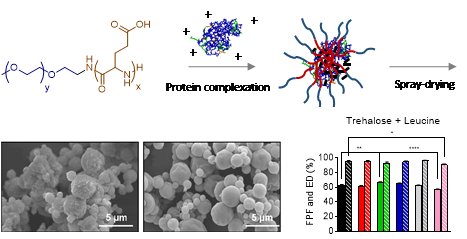Nanomaterials Formulation and Characterisation
Our research focuses on understanding how to get a particular molecular therapy into patients effectively and efficiently.
We look at new processes for formulating molecules into medicines and for understanding these formulation processes.
Examples include:
- real-time chemical imaging and mechanistic modelling of tablet dissolution
- micro-array formats for formulation screening at the nano-gram scale
- stabilising amorphous solid dispersions
- and controlling crystallisation
Characterisation approaches include:
- spectroscopy (infra-red and Raman)
- X-ray diffraction
- optical imaging and image analysis
- and thermal characterisation (differential scanning calorimetry and thermo-gravimetric analysis)
Molecular informatics approaches are also used to develop predictive models about how a particular molecule will interact with excipients in a formulation.

From
Nieto-Orellana A, et. al International Journal of Pharmaceutics. 2018;540(1):78-88
Proposed publications:
- Alqahtani S, Roberts CJ, Stolnik S, Bosquillon C. Development of an In Vitro System to Study the Interactions of Aerosolized Drugs with Pulmonary Mucus. Pharmaceutics. 2020;12(2) Madeira do O J, Foralosso R, Yilmaz G
- Mastrotto F, King PJS, Xerri RM, et al. Poly(triazolyl methacrylate) glycopolymers as potential targeted unimolecular nanocarriers. Nanoscale. 2019;11(44):21155-66
- Nieto-Orellana A, Coghlan D, Rothery M, Falcone FH, Bosquillon C, Childerhouse N, et al. Dry-powder formulations of non-covalent protein complexes with linear or miktoarm copolymers for pulmonary delivery. International Journal of Pharmaceutics. 2018;540(1):78-88